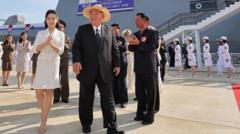As Kim Jong Un firmens his grip on information within North Korea, clandestine efforts by South Korea seek to challenge state propaganda through music, television dramas, and educational content, revealing a complex battle beyond open hostilities.
The Battle of Information: North and South Korea’s War Below the Surface

The Battle of Information: North and South Korea’s War Below the Surface
Amid escalating tensions, North and South Korea engage in an underground information war targeting the beliefs and knowledge of North Korean citizens.
In recent months, the ongoing conflict between North and South Korea has manifested in a surprising arena: an underground information war. The heavily fortified border, characterized by barbed-wire fencing and military posts, has seen the deployment of large, camouflaged speakers that blast South Korean pop music interspersed with pointed messages aimed at North Koreans. Standing at the border, a South Korean voice thunders, "When we travel abroad, it energises us," a stark reminder of the freedoms denied to those in the North.
While outright warfare between the two nations has not occurred in years, the battle for hearts and minds continues with fervor. South Korea attempts to penetrate the information blackout enforced by Kim Jong Un, who has worked tirelessly to shield his people from external influences. North Korea's internet remains virtually non-existent, and all media is state-controlled, reinforcing a monopolistic narrative about the regime and the Kim family's legacy.
Martyn Williams, a senior fellow at the Stimson Center, notes that exposing the lies propagated by the North Korean regime could potentially destabilize Kim's rule. To confront this, South Korean initiatives go beyond mere audio broadcasts; they involve a clandestine network that disseminates foreign content, including films and K-pop music, into North Korea under the cover of darkness. USBs and micro-SD cards filled with foreign entertainment are smuggled across the border, presenting a risk of severe punishment for those caught.
Despite these efforts, concerns have arisen that North Korea is regaining control of the information flow. Kim Jong Un has tightened his grip since the onset of the pandemic, building new electric fences and instituting heavier penalties for citizens caught engaging with foreign media. Experts have noted a chilling effect on information circulation, with accusations leading to imprisonment or even execution.
Individual acts of defiance against the regime may be rare, but organizations like Unification Media Group (UMG) work tirelessly to send out curated content aimed at inspiring North Koreans. Testimonies from defectors suggest that exposure to this content motivates some to risk their lives for freedom. One young woman, Kang Gyuri, recounted how K-dramas became instrumental in her realization of life outside North Korea’s constraints and eventually inspired her escape.
The landscape of information warfare has shifted with recent cuts in U.S. funding for programs supporting North Korean information dissemination. Critics are concerned that funding cuts at the hands of former President Trump, aimed at reducing federal expenditures, might inadvertently empower Kim's regime by shutting down one of the few apertures through which outside information could penetrate.
The question of who should finance these initiatives looms large, with discussions around the politicization of North Korean issues complicating efforts within South Korea. Yet, amidst the uncertainty, advocates remain optimistic, believing that the seeds of information sown over time are impossible for the regime to eradicate completely. As technological advancements continue, the potential to spread knowledge and change perceptions within North Korea could pave the way for a transformative shift in the future.
While outright warfare between the two nations has not occurred in years, the battle for hearts and minds continues with fervor. South Korea attempts to penetrate the information blackout enforced by Kim Jong Un, who has worked tirelessly to shield his people from external influences. North Korea's internet remains virtually non-existent, and all media is state-controlled, reinforcing a monopolistic narrative about the regime and the Kim family's legacy.
Martyn Williams, a senior fellow at the Stimson Center, notes that exposing the lies propagated by the North Korean regime could potentially destabilize Kim's rule. To confront this, South Korean initiatives go beyond mere audio broadcasts; they involve a clandestine network that disseminates foreign content, including films and K-pop music, into North Korea under the cover of darkness. USBs and micro-SD cards filled with foreign entertainment are smuggled across the border, presenting a risk of severe punishment for those caught.
Despite these efforts, concerns have arisen that North Korea is regaining control of the information flow. Kim Jong Un has tightened his grip since the onset of the pandemic, building new electric fences and instituting heavier penalties for citizens caught engaging with foreign media. Experts have noted a chilling effect on information circulation, with accusations leading to imprisonment or even execution.
Individual acts of defiance against the regime may be rare, but organizations like Unification Media Group (UMG) work tirelessly to send out curated content aimed at inspiring North Koreans. Testimonies from defectors suggest that exposure to this content motivates some to risk their lives for freedom. One young woman, Kang Gyuri, recounted how K-dramas became instrumental in her realization of life outside North Korea’s constraints and eventually inspired her escape.
The landscape of information warfare has shifted with recent cuts in U.S. funding for programs supporting North Korean information dissemination. Critics are concerned that funding cuts at the hands of former President Trump, aimed at reducing federal expenditures, might inadvertently empower Kim's regime by shutting down one of the few apertures through which outside information could penetrate.
The question of who should finance these initiatives looms large, with discussions around the politicization of North Korean issues complicating efforts within South Korea. Yet, amidst the uncertainty, advocates remain optimistic, believing that the seeds of information sown over time are impossible for the regime to eradicate completely. As technological advancements continue, the potential to spread knowledge and change perceptions within North Korea could pave the way for a transformative shift in the future.




















